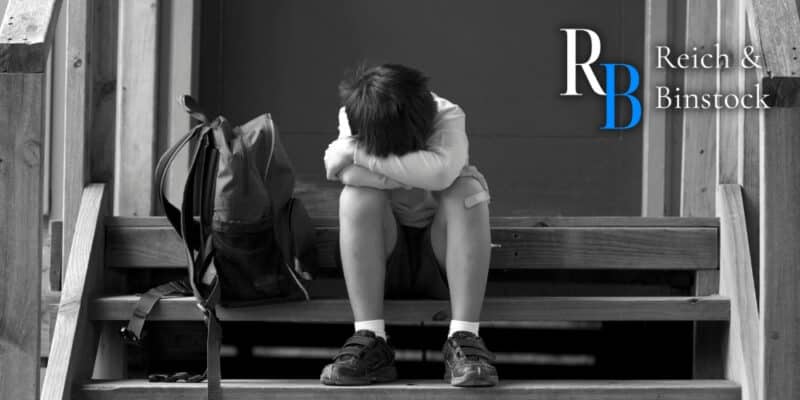LAWSUIT FOR SEXUAL ABUSE IN SCHOOLS
SEXUAL ABUSE
Sexual Abuse in Public and Private Schools

Many parents worry about their child facing bullying at school, but many parents never consider the possibility of sex abuse at school. Unfortunately, some children experience sexual harassment while at school, whether it’s from school employees or other students. In this article, our nationally-recognized sexual abuse lawyers offer insight on how to spot the signs of sexual misconduct in victims.
In the state of Texas, 1 in 4 girls and 1 in 6 boys will experience sexual abuse before their 18th birthday. Unfortunately, child abuse can happen anywhere, including both public and private schools. If your child is an abuse victim, contact a Texas child sexual abuse lawyer at Reich & Binstock immediately. We want to help you and your child recover while holding the abuser accountable. Call us today at 713-622-7271 to see how we can help in the fight against sexual abuse in schools.
What Is Child Sexual Abuse?
Sexual abuse is when a child is raped or forced to perform a sexual act. Also falling under the umbrella of sexual abuse is when children are used as a means to arouse the abuser. This might mean the abuser is making the child undress, showing the child inappropriate or pornographic material, or touching a child’s genitals or other body parts.
What Is School Abuse?
The signs of abuse aren’t always inherently obvious. The signs also vary widely depending on the type of abuse a child may be experiencing. There are some red flags that parents can look out for though.
Types of Abuse in Schools
Children can be physically, sexually, mentally, and emotionally abused in both public and private school districts.
Signs and Symptoms of Physical Abuse
Signs and symptoms of physical abuse to look out for in children include:
- Unexplained marks, bruises, scratches, or other injuries
Signs and Symptoms of Sexual Abuse
Red flags that could indicate child sexual abuse at school are obviously different. Be sure to look out for:
- Unusual sexual behavior that’s too “mature” for their age
- Inappropriate sexual conduct with other kids
- Genital pain, bleeding, or discharge
- Pregnancy
- Sexually transmitted infections
- Statements that indicate he or she was touched inappropriately
Signs and Symptoms of Mental or Emotional Abuse
Red flags that could indicate mental or emotional abuse at school can be harder to pinpoint. Be sure to look out for:
- Sudden loss of self-confidence
- Social withdrawal from friends or family
- Depression
- New avoidance behaviors, such as refusing to ride the bus or go to school
- A new desperation for affection
- Suddenly earning poor grades in school
- Loss of interest in typical hobbies and activities
- Attempts at running away
- Changes in behavior, such as aggression, anger, or hyperactivity
- Self-harm or suicide attempts
Most Common Forms of Sexual Misconduct in Schools
There are many types of sexual abuse that can happen in schools, all equally traumatic and disturbing to any child. The most common types are exhibitionism (an adult exposing their genitalia to a child), unwanted sexual touching, inappropriate comments, an adult masturbating in front of a child, an adult forcing a child to masturbate, sharing pornographic content with a child, or any kind of sex with a child (vaginal, oral, anal).
Inappropriate relationships between underage students and staff members can very quickly develop a sexual nature. Preventing sexual abuse often begins with recognizing the signs and behavioral problems of students who have been sexually abused. It is equally important for parents, students, and other staff members to report suspicions as soon as possible.
School Abuse by Teachers
Teachers can abuse their students in a variety of ways, not just sexually. Common examples of abuse by teachers in schools include:
- Excessive or unauthorized use of corporal punishment
- Discrimination based on race, gender, or a disability
- Restrictions involving freedom of expression and free speech
- Not addressing a student’s special needs, such as handicap access
- Unfair academic treatment, such as grading bias or preferential treatment
- Denial of educational opportunities
- Emotional, physical, or sexual harassment of a child
Abuse Coverup by Administration
What makes child abuse even worse is when school administrators actively try to cover it up. Unfortunately, this can and does happen, no matter what kind of school district the abuse occurs in. School administrators can cover up abuse in a variety of ways, including the following.
Exposing the Child’s Name
School administrators may intentionally release the name of the student or family that filed a complaint. This can turn into a very dangerous situation for the child especially if the abuser is an authority figure. The child may be subject to even more abuse as a consequence of speaking up. Additionally, releasing the victim’s name may give school officials more leverage.
Reporting Delays
School officials may also delay reporting the incident to anyone to protect the abuser. As a result, the parents of the victim are often the last ones to find out about the abuse. When first hearing of an abuse situation at school, administrators should immediately respond like this:
- Meet with the abuser first to verify the facts
- Talk with a child sexual abuse lawyer to understand the severity of the incident and how extensive legal action will be
- Formulate an internal plan depending on if the abuser is another student or a staff member
If the abuser happens to be another student, school officials should handle the situation by:
- Not exposing the victim’s name to the abuser
- Informing the victim’s parents
Interrogating Victims Without Permission
Oftentimes, school officials will interrogate children about their abuse without notifying the parents. While this isn’t necessarily illegal, it shouldn’t be allowed. This is because an interrogation without parental permission can instill fear in victims which can prevent them from speaking up. There have unfortunately been a few suicides among minors in the U.S. relating to interrogations without parental knowledge.
Vague and Minimal Communication
If a school is trying to cover up abuse, administrators may withhold details of the incident. Additionally, if parents ask questions that incriminate the school, administrators may claim they can’t release that information to protect the abuser’s privacy. This is an example of a school official attempting to use the parent’s minimal knowledge of Title IX against them. Instead, school officials must investigate and inform parents of the abusive situation under Title IX, even if the school is incriminated in the process.
Trivialize, Dismiss, or Deny to Cast Doubt
Another tactic a school official may use to cover up abuse is to trivialize, dismiss, or deny the abuse. They may also cast doubt on the victim’s story by claiming they are:
- Seeking attention
- Remembering the abuse incorrectly
- Confusing the abusive gestures with something more innocent or acceptable
- Exaggerating or lying
Deflect, Deny, and Delay Response
Oftentimes, school administrators will drag out an abuse resolution in the hope that the parents will drop the case. This is because administrators know that stalling will cause more harm to the child which will cause the parents to become increasingly distraught over their child’s well-being. As a result, parents will often drop the complaint for the sake of their child.
Attack and Ban Parents from School Campus
If parents keep insisting that the school take action in response to their child’s abuse, the school may respond by attacking the parents. Some common school attacks are:
- Saying “if you don’t like this school, it’s probably not the right fit for your child.”
- Having a meeting with school staff to shun the parents.
- Saying something like: “Our school is not a zero-tolerance school. We have a restorative style.”
Attack the Victim
Another way a school may retaliate if parents continually insist on immediate action is by attacking the victim instead. In this situation, administrators may meet with the victim to shame, threaten, and scare them into silence. Students who have been sexually abused are often in a vulnerable state, which makes them easy targets for harassment and intimidation from school administrators.
Protecting the Abuser
Schools may protect the abuser and their image at all costs, especially if the abuser is a staff member. Schools may do this by negotiating a severance package with paid leave, relocating the abuser to a different school or district, failing to report the abuse to police, or failing to report the incident to another school when it calls for references.
School Abuse by Other Students
While staff-on-student abuse seems more common because it grabs the most headlines, student-on-student abuse is extremely common as well. In fact, more than 17,000 sexual assault reports between K-12 students were filed in the United States between 2011 and 2015. In student-on-student abuse, it’s crucial that parents report the situation to the school as soon as possible. If the school doesn’t handle the situation appropriately, call a child sexual abuse lawyer immediately.
Public School Sexual Abuse
At least 1 in 10 students in the public school system will experience sexual abuse from an employee before they graduate high school. These instances can occur at school, at a school event, outside of school, or even online.
Victims of abuse can be either male or female, as can the abusers. However, 56% of victims of school-related abuse are female, while 67% of offenders are male. Unfortunately, only 53% of offenders are convicted and 51% are registered as sex offenders.
Private School Sexual Abuse
Many parents believe that their children will be more safe from abuse in private schools compared to public schools. However, private schools don’t guarantee any more safety from abusers than public schools do. Anyone can be an abuser in a private school including:
- Another student (typically an older child)
- Teacher’s aid or substitute teacher
- Coach or assistant coach
- Playground attendant
- Office worker
- Groundskeeper
Catholic School Sexual Abuse
Sexual abuse within the Catholic Church has been a major and frequent news headline over recent decades. Much of this sexual abuse doesn’t just happen within church, but within Catholic private schools as well. According to research by the John Jay College of Criminal Justice, 4,450 of the 110,000 priests (4%) who served as church clergy between 1950 and 2002 have faced child sexual abuse allegations. Priests and deacons aren’t the only likely predators in Catholic schools though. Teachers, coaches, and office workers are just as likely to be abusers.
College and University Sexual Abuse
College-age students are at a very high risk for sexual violence. For example, 26.4% of undergraduate women and 6.8% of undergraduate men are sexually assaulted according to RAINN. Even more disheartening, only 20% of female victims report their assault to police according to the same source.
How to File a School Abuse Lawsuit
Depending on the severity or type of abuse within a school, filing a lawsuit can be tricky.
Contact the School
The first thing you need to do is contact the school and the school board if necessary. Schedule a meeting with or without your child to discuss the incident.
Request an Investigation
The next important step is to request an investigation by the school. This means that school officials will need to speak with all involved parties as well as witnesses. Depending on the severity of the abuse and how the school handles the situation, law enforcement involvement may be necessary.
File a Lawsuit with a Child Sexual Abuse Lawyer
Even if the school handles the situation appropriately by firing the abusive employee or expelling the abusive student, you may still have grounds to sue the school or the abuser. If that’s the case, a child sexual abuse lawyer at Reich & Binstock will help you determine next steps.
Contact a Child Sexual Abuse Lawyer Today
If you believe your child has been a victim to abuse in school, call a child sexual abuse lawyer at Reich & Binstock as soon as possible. We want to make sure your child receives justice and future safety in school. Call 713-622-7271 or use our contact form to schedule a free consultation.
There is never a fee unless we recover on your behalf.
Additionally, clients are not obligated to pay expenses if a recovery is not made.















